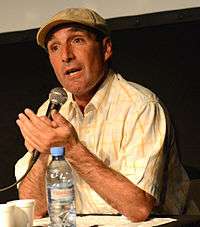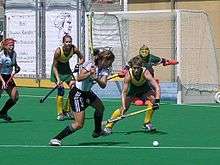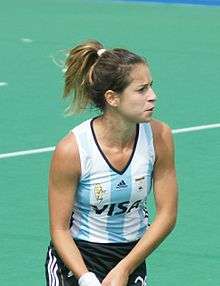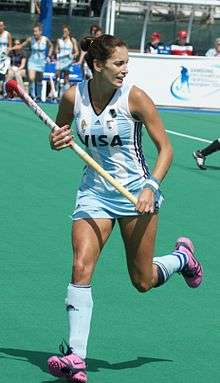Argentina women's national field hockey team
The Argentina women's national field hockey team (Spanish: Selección femenina de hockey sobre césped de Argentina) is governed by the Argentine Hockey Confederation (CAH). The current coach is Carlos Retegui, who was appointed after Agustín Corradini. The team is currently third in the FIH World Rankings since july 2019 after their 4th place at the 2019 FIH Pro League.
 | |||||||||||||||||||||||||||
| Nickname | Las Leonas (The Lionesses) | ||||||||||||||||||||||||||
|---|---|---|---|---|---|---|---|---|---|---|---|---|---|---|---|---|---|---|---|---|---|---|---|---|---|---|---|
| Association | Confederación Argentina de Hockey (CAH) | ||||||||||||||||||||||||||
| Confederation | PAHF (Americas) | ||||||||||||||||||||||||||
| Coach | Carlos Retegui | ||||||||||||||||||||||||||
| Assistant coach(es) | Mario Almada, Santiago Capurro and Fernando Ferrara | ||||||||||||||||||||||||||
| Manager | Silvia Suppa and Alejandro Doherty | ||||||||||||||||||||||||||
| Captain | Rosario Luchetti | ||||||||||||||||||||||||||
| Most caps | Luciana Aymar (376) | ||||||||||||||||||||||||||
| Top scorer | Noel Barrionuevo (182) | ||||||||||||||||||||||||||
| |||||||||||||||||||||||||||
| FIH ranking | |||||||||||||||||||||||||||
| Current | 3 | ||||||||||||||||||||||||||
| Highest | 1st (2003 – 2010 – 2011) | ||||||||||||||||||||||||||
| Lowest | 4 (2018) | ||||||||||||||||||||||||||
| Olympic Games | |||||||||||||||||||||||||||
| Appearances | 7 (first in 1988) | ||||||||||||||||||||||||||
| Best result | 2nd (2000 – 2012) | ||||||||||||||||||||||||||
| World Cup | |||||||||||||||||||||||||||
| Appearances | 14 (first in 1974) | ||||||||||||||||||||||||||
| Best result | 1st (2002 – 2010) | ||||||||||||||||||||||||||
| Pan American Games | |||||||||||||||||||||||||||
| Appearances | 9 (first in 1987) | ||||||||||||||||||||||||||
| Best result | 1st (7 times) | ||||||||||||||||||||||||||
| Pan American Cup | |||||||||||||||||||||||||||
| Appearances | 5 (first in 2001) | ||||||||||||||||||||||||||
| Best result | 1st (2001, 2004, 2009, 2013, 2017) | ||||||||||||||||||||||||||
| Olympic medal record | ||
|---|---|---|
| 2000 Sydney | Team | |
| 2004 Athens | Team | |
| 2008 Beijing | Team | |
| 2012 London | Team | |
Las Leonas (The Lionesses) have appeared in five Hockey World Cup finals, including the first final in 1974, which they lost 1–0 to the Netherlands. Argentina had to settle with second place in two more finals before winning the tournament for the first time in 2002, beating the Netherlands 4–3 in the final on penalty strokes after a 1–1 draw. Argentina, led by eight-time FIH Player of the Year Luciana Aymar won again in 2010, a 3–1 victory over the Netherlands. Argentina's World Cup-winning coaches are Sergio Vigil in 2002, and Carlos Retegui in 2010.
Argentina has been very successful at the Summer Olympics, winning four consecutive medals (two silver, two bronze) since the 2000 edition, when they became the first women's team in any sport to win an Olympic medal for their country. Luciana Aymar is the only player that has participated and won those four medals. Also, after their first title in 2001 at a Champions Trophy, they have won the tournament six more times. In front of a home crowd, they won the 2014–15 World League as the first international title after Aymar's retirement from the national team the previous year.
At a continental level, Argentina has dominated and won every tournament they played, including the Women's Pan American Cup and the Pan American Games leaving the United States with second place on most events until they lost the 2011 Pan American Games final for the first time.
In July 2003, after the implementation of an official World Ranking System, Argentina reached the top of the FIH World Rankings for the first time, reaching it again in 2010 after obtaining the World Cup title and once more in late 2013.
History
Hockey was introduced in Argentina by English immigrants at the beginning of the 20th century, and the first women's teams were officially formed in 1909.[2] In 1997, Sergio Vigil, a former player for the men's national team, was appointed coach. Under his leadership, Las Leonas achieved their first World Hockey Cup title, their first Olympic medals, their first Champions Trophy medals, and many other achievements. The team went from having a rather limited audience to becoming a national sensation, with some of the players even appearing as models in advertising campaigns.
Nickname
Throughout its history, the team has developed a reputation for being tenacious even when a match appears to be lost. For this reason, a lioness was chosen as their symbol when the team qualified for the 2000 Summer Olympics. During the second round of games, Argentina played against the powerful Dutch team, and they chose this occasion to place the image of a lioness on their shirts for the first time.
The image was designed by then-player Inés Arrondo together with Vigil's sister-in-law.[3] Argentina won that match, went on to win the silver medal, and Las Leonas were born. Subsequently, the junior (under 21) team is called Las Leoncitas ("the baby lionesses" or "the lioness cubs").
The lioness logo was redesigned in 2006 by the team kit supplier, Adidas, along with Confederación Argentina de Hockey and even some of the most representative players. This is slightly different from the original, showing the lioness' tail pretending to be a hockey stick while holding a ball.[4]
The nickname also falls in line with an unwritten Argentine tradition of naming national teams after big cats: the men's field hockey team is called Los Leones ("The Lions"), the men's rugby union team is called Los Pumas ("The Pumas"), and the women's volleyball team is known as Las Panteras ("The Panthers").
Honours
Since its breakthrough in the 2000 Summer Olympics (where the team nicknamed "Las Leonas"' for the first time),[5] Argentina has won more than 20 official titles, which are detailed below:
.jpg)
- Summer Olympics:
- Silver medal: Sydney 2000,[6] London 2012[7]
- Bronze medal: Athens 2004, Beijing 2008
- World Cup: 2002, 2010[8]
- FIH Hockey World League: 2014–15
- Champions Trophy: 2001, 2008, 2009, 2010, 2012, 2014, 2016
- Pan American Cup: 2001, 2004, 2009, 2013, 2017
- Pan American Games: 1987, 1991, 1995, 1999, 2003, 2007, 2019
- South American Championship: 2003, 2006, 2008, 2010, 2013, 2014, 2018
Tournament records
Players
Current squad
The following players were called to compete on four matches between 28th February to 8th March of the Pro League against New Zealand and Australia in Christchurch, New Zealand and Perth, Australia respectively.[17]
Players, caps and goals updated as of 8 March 2020.
Head coach: Carlos Retegui
| No. | Pos. | Player | Date of birth (age) | Caps | Goals | Club |
|---|---|---|---|---|---|---|
| 13 | GK | Cristina Cosentino | 22 December 1997 | 17 | ||
| 36 | GK | Mariana Scandura | 2 May 1994 | 3 | ||
| 3 | DF | Agustina Gorzelany | 11 March 1996 | 53 | 16 | |
| 7 | DF | Giselle Kañevsky © | 4 August 1985 | 151 | 3 | |
| 32 | DF | Valentina Costa Biondi | 13 September 1995 | 36 | 2 | |
| 40 | DF | Emilia Forcherio | 16 February 1995 | 3 | 0 | |
| 2 | MF | Sofía Toccalino | 20 March 1997 | 93 | 7 | |
| 5 | MF | Agostina Alonso | 1 October 1995 | 87 | 5 | |
| 18 | MF | Victoria Sauze | 21 July 1991 | 81 | 2 | |
| 22 | MF | Eugenia Trinchinetti | 17 July 1997 | 101 | 13 | |
| 29 | MF | Victoria Miranda | 5 June 2000 | 15 | 0 | |
| 38 | MF | Constanza Cerundolo | 19 June 2000 | 7 | 1 | |
| 9 | FW | Priscila Jardel | 16 January 1996 | 21 | 7 | |
| 15 | FW | María José Granatto | 21 April 1995 | 132 | 73 | |
| 19 | FW | Agustina Albertario | 1 January 1993 | 166 | 49 | |
| 21 | FW | Victoria Granatto | 9 April 1991 | 24 | 7 | |
| 23 | FW | Micaela Retegui | 23 April 1996 | 38 | 5 | |
| 28 | FW | Julieta Jankunas | 20 January 1999 | 100 | 45 | |
Recent call-ups
These players were called-up in the last 12 months.
| Pos. | Player | Date of birth (age) | Caps | Goals | Club | Latest call-up |
|---|---|---|---|---|---|---|
| GK | Belén Succi | 16 October 1985 | 238 | 16 February 2020, v. | ||
| DF | Noel Barrionuevo | 16 May 1984 | 337 | 182 | 16 February 2020, v. | |
| DF | Silvina D'Elía | 25 April 1986 | 254 | 53 | 16 February 2020, v. | |
| MF | Rosario Luchetti | 4 June 1984 | 289 | 41 | 16 February 2020, v. | |
| MF | Rocío Sánchez Moccia | 2 August 1988 | 247 | 17 | 16 February 2020, v. | |
| MF | Delfina Thome | 10 September 1996 | 8 | 0 | 16 February 2020, v. | |
| MF | Sofía Ramallo | 26 March 2001 | 3 | 0 | 2 February 2020, v. | |
| MF | Celina di Santo | 23 February 2000 | 13 | 0 | 28 January 2020, v. | |
| FW | Carla Rebecchi | 7 September 1984 | 317 | 168 | 16 February 2020, v. | |
| FW | Delfina Merino | 15 October 1989 | 294 | 96 | 16 February 2020, v. | |
| FW | Josefina Rübenacker | 26 August 2000 | 4 | 0 | 2 February 2020, v. | |
Past players
- Gabriela Aguirre – Yet active
- Magdalena Aicega – Yet active
- Laura Aladro
- Mariela Antoniska
- Inés Arrondo
- Luciana Aymar
- Moira Brinnand
- Claudia Burkart
- Victoria Carbó
- Julieta Castellán
- Martina Cavallero – Yet active
- Laura del Colle
- María Colombo
- Silvia Corvalán
- Marina di Giacomo
- Bianca Donati – Yet active
- Carla Dupuy – Yet active
- Magdalena Fernández Ladra – Yet active
- Milagros Fernández Ladra – Yet active
- María Paz Ferrari
- Andrea Fioroni
- Julieta Franco
- Anabel Gambero
- Soledad García
- Julia Gomes Fantasia – Yet active
- Mariana González Oliva
- Alejandra Gulla
- Agustina Habif - Yet active
- Florencia Habif - Yet active
- María de la Paz Hernández – Yet active
- Marcela Hussey
- Priscila Jardel – Yet active
- Giselle Juárez – Yet active
- Gabriela Liz
- Marisa López
- Sofía Maccari – Yet active
- Sofía MacKenzie
- Laura Maiztegui
- Mercedes Margalot
- Karina Masotta
- Laura Mulhall
- Florencia Mutio – Yet active
- Vanina Oneto
- Paula Ortiz - Yet active
- Alejandra Palma
- Gabriela Pando
- María Gabriela Pazos
- Marcela Richezza
- Jorgelina Rimoldi
- Macarena Rodríguez – Yet active
- Cecilia Rognoni
- Pilar Romang – Yet active
- Mariana Rossi
- Mariné Russo – Yet active
- Gabriela Sánchez
- Mariela Scarone
- Daniela Sruoga – Yet active
- Josefina Sruoga – Yet active
- Ayelén Stepnik
- María Alejandra Tucat
- Lucina von der Heyde - Yet active
- Paola Vukojicic
- Victoria Zuloaga – Yet active
Not in use jersey numbers
When Luciana Aymar (eight-time FIH Player of the Year Award winner and regarded as the best player in the history of the sport),[20][18][19] retired from the national team in 2014 after 376 international matches played, some of Aymar's teammates (such as Carla Rebecchi) asked the Confederation for the retirement of her iconic number 8 worn by her during 17 years with the national team.[21] Nevertheless, the number is not officially retired by the CAH, although it has not been assigned to other players since.
Captains
| Period | Captain | Vice-captain |
|---|---|---|
| 1997–2002 | Karina Masotta | Magdalena Aicega |
| 2003–2005 | Magdalena Aicega | Cecilia Rognoni |
| 2006–2008 | Luciana Aymar | |
| 2009–2014 | Luciana Aymar | Rosario Luchetti |
| 2014–2015 | Macarena Rodríguez | Carla Rebecchi |
| 2015–2017 | Carla Rebecchi | Belén Succi |
| 2017–2018 | Belén Succi | Delfina Merino |
| 2019–Present | Rosario Luchetti | Carla Rebecchi |
Coaches

| Period | Name |
|---|---|
| 1986–1991 | Miguel MacCormik |
| 1991–1997 | Rodolfo Mendoza |
| 1997–2004 | Sergio Vigil |
| 2004–2009 | Gabriel Minadeo |
| 2009–2012 | Carlos Retegui |
| 2012–2013 | Marcelo Garraffo |
| 2013 | Emanuel Roggero |
| 2013–2014 | Carlos Retegui (2nd cycle) |
| 2014–2015 | Santiago Capurro |
| 2015–2017 | Gabriel Minadeo (2nd cycle) |
| 2017–2018 | Agustín Corradini |
| 2018–Present | Carlos Retegui (3rd cycle) |
Gallery
_(2).jpg) Luciana Aymar, named "Player of the Year" eight times
Luciana Aymar, named "Player of the Year" eight times Mariné Russo in a match against Australia in 2005
Mariné Russo in a match against Australia in 2005 Mercedes Margalot in a match against Nederlands in 2005
Mercedes Margalot in a match against Nederlands in 2005 Celebrating their win after the 2010 Champions Trophy final.
Celebrating their win after the 2010 Champions Trophy final..jpg) The 2010 World Champion squad
The 2010 World Champion squad
 A Goalkeeper
A Goalkeeper.jpg) Champions Trophy winners in 2016
Champions Trophy winners in 2016
See also
Notes
References
- "FIH Men's and Women's World Ranking". FIH. 1 March 2020. Retrieved 1 March 2020.
- (in Spanish) History of the Argentine Hockey Confederation Archived 11 May 2011 at the Wayback Machine
- (in Spanish) Interview with Inés Arrondo Archived 19 September 2010 at the Wayback Machine by DeporTEA Press, 10 August 2010.
- "Archived copy" (in Spanish). Archived from the original on 6 July 2011. Retrieved 21 November 2010.CS1 maint: archived copy as title (link), 29 September 2006.
- "El nacimiento de Las Leonas", CanchaLlena, 24 September 2010
- "Igual son de oro", Clarín, 30 September 2000
- "Las Leonas perdieron y tuvieron que conformarse con la de plata" by Sabrina Faija, Clarín, 12 August 2012
- ""Las Leonas son campeonas mundiales y un verdadero orgullo de la Argentina", Los Andes, 11 September 2010". Archived from the original on 19 September 2010. Retrieved 11 October 2013.
- "Home – FIH".
- "Pan American Cups".
- "Pan American Games".
- "South American Championships".
- "Home – FIH".
- "FIH confirms Spain men and Belgium women join Hockey Pro League". FIH.
- "Home – FIH".
- "Home – FIH".
- https://www.cahockey.org.ar/noticia/las-leonas-para-afrontar-la-fih-pro-league-en-oceania/3121
- Top 10 greatest field hockey players, The Telegraph, 5 Jan 2015
- It's all about Aymar by Melina Gaspar, on The Hockey Family, 10 Aug 2017
- Luciana Aymar profile on CAH website
- Rebecchi pidió retirar la camiseta número 8, Télam, 8 Dec 2014
External links
| Wikimedia Commons has media related to Argentina national field hockey team. |
